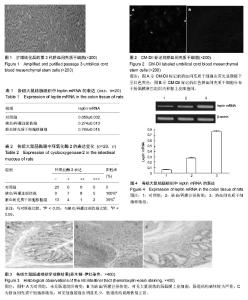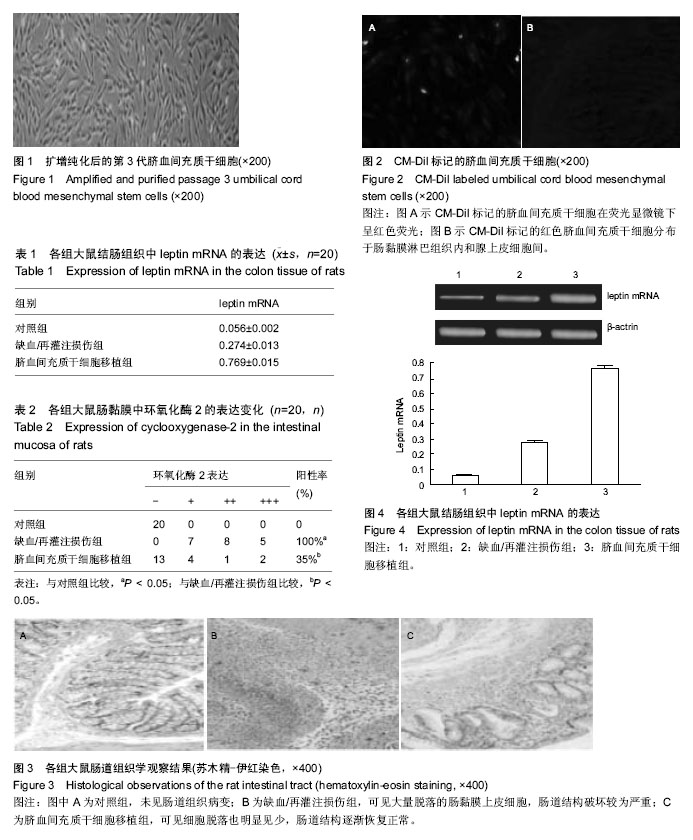| [1] Wang F, Shen Y, Tsuru E, et al. Syngeneic transplantation of newborn splenocytes in a murine model of neonatal ischemia-reperfusion braininjury. J Matern Fetal Neonatal Med. 2015;28(7):824-827.[2] 杜莉莉,杨晓漪,吕润潇,等.胎盘间充质干细胞对小鼠小肠缺血再灌注损伤的作用[J]. 解剖学进展, 2015,21(4): 371-374.[3] Diepenhorst GM, van Gulik TM, Hack CE. Complement mediated ischemia-reperfusion injury: lessons learned from animal and clinical studies. Ann Surg.2009;249(6): 889-899.[4] Marshman E, Booth C,Potten CS. The intestinal epithelial stem cell. Bioessays. 2002;24(1): 91-98.[5] Khanna A,Rossman J,Caty MG, et al.Beneficial effects of intraluminal nitroglycerin in intestinal ischemia- reperfusion injury in rats. J Surg Res. 2003;114(1):15-24.[6] 马晓博,赵瑛.肠内肠外营养对大鼠肠道损伤后屏障功能恢复的实验研究[J].中华临床医师杂志(电子版), 2012, 6(12):3194-3197.[7] Yang X, Liu YN, Han Q, et al. Injured microenvironment directly guides the differentiation of engrafed Flk-1(+) mesenchymal stem cell in lung. Exp Hematol. 2007;35(9):1466-1475.[8] Zhang YJ,Hao HJ,Liu JJ,et al.Repair and regeneration of skin injury by transplanting microparticles mixed with Wharton,s jelly and MSCs from the human umbilical cord. Int J Low Extrem Wounds. 2012;11(4):264-270.[9] Biazar E, Keshel SH.The healing effect of stem cells loaded in nanofibrous scaffolds on full thickness skin defects. J Biomed Nanotechnol. 2013;9(9):1471-1482.[10] Heo JS,Choi SM,Kim HO,et al.Neural transdifferentiation of human bone marrow mesenchymal stem cells on hydrophobic polymer-modified surface and therapeutic effects in an animal model of ischemic stroke. Neuroscience. 2013;238(6):305-318.[11] Manley NC,Steinberg GK.Tracking stem cells for cellular therapy in stoke. Curre Pharm Des. 2012;18(25):3685- 3693.[12] 余奇劲,杨洁,陈娟.却学前和缺血后联合应用丙泊酚对兔脊髓缺血再灌注损伤的保护作用[J].中华临床医师杂志, 2011,5(20):5955-5959.[13] 张瑞平,李健丁,刘强,等.蛛网膜下腔移植磁标间骨髓充质干细胞治疗脊髓损伤[J].中国组织工程研究,2013, 17(1): 74-78.[14] 冯玉,白文芳,许伟成,等. 低频电磁场促进骨髓间充质干细胞移植修复大鼠脊髓损伤的实验研究[J].中国组织工程研究, 2013,17(32):5819-5826.[15] 高平,孙占胜,王伯珉,等.骨髓间充质干细胞诱导成神经元样细胞移植治疗脊髓损伤[J].中国组织工程研究,2013, 17(23):4256-4263.[16] Majore I, Moretti P, Stahl F,et al.Growth and differentiation properties of mesenchymal stromal cell populations derived from whole human umbilical cord. Srem Cell Rev. 2011;7(1):17-31.[17] Lu H, Ge ZZ, Liu WZ,et al.Expresstion of cyclooxygenase-2 protein in colonic diseases. Chin J Gastroenterol. 2000;5(3):158-160.[18] Mattein J,Koomagi R,Volm M,et al.Association of vascular endothelial growth factor expression with intratumoral microvessel density and tumour cell proliferation in human epidermoid lung carcinoma. Br J Cancer. 1996;73(7):931-934.[19] Le Blanc K,Ring den O.Mesenchymal stem cells: properties and role in clinjcal bone marrow transplantation. Curr Opin Immunol. 2006;18(5):586- 591.[20] Harvey J.Leptin: a diverse regulator of neuronalfunction. J Neurochem. 2007;100(2): 307-313. [21] Myers MG Jr. Leptin receptor signaling and the regulation of mammalian physiology. Recent Prog Horm Res. 2004;59: 287-304.[22] Munzberg H, Bjornholm M, Bates SH,et al.Leptin receptor action and mechanisms of leptin resistance.Cell Mol Life Sci. 2005;62(6): 642-652.[23] Stefanou N, Satra M,Papanikolaou V,et al.Leptin receptor isoforms mRNA expression in peripheral blood mononuclear cells from patients with chronic viral hepatitis. Exp Biol Med (Maywood). 2006;231(10): 1653-1663.[24] Chelikani PK,Glimm DR, Kennelly JJ. Short communication: Tissue distribution of leptin and leptin receptor mRNA in the bovine. J Dairy Sci. 2003; 86(7): 2369-2372.[25] Gallardo N, Arribas C,Villar M, et al. ObRa and ObRe are differentially expressed in adipose tissue in aged food-restricted rats: effects on circulating soluble leptin receptor levels. Endocrinology. 2005; 146(11):4934- 4942.[26] Sayed-Ahmed A, Kulcsar M, Rudas P, et al. Expression and localisation of leptin and leptin receptor in the mammary gland of the dry and lactating non-pregnant cow. Acta Vet Hung. 2004;52(1):97-111.[27] Buyse M, Aparicio T, Guilmeau S, et al. Paracrine actions of the stomach-derived leptin. Med Sci (Paris). 2004;20(2): 183-188. |

